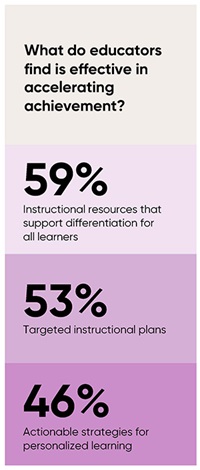Report: Educator Perception of Academic Growth Is on the Rise
- By Kristal Kuykendall
- 10/31/23
Educators reported seeing more growth in students’ academic achievement during the 2022–23 school year, and two-thirds of educators believe that technology connecting instruction and assessment on one platform “has the power to transform teaching and learning,” according to a national survey conducted for HMH’s 2023 Educator Confidence Report.
 The third and final release from the 2023 Educator Confidence Report, themed Outlook on Academic Recovery, covers responses from 1,000 teachers and 215 administrators surveyed between May 10 and June 27 by MarketCast on behalf of HMH. The report focuses on educator sentiment about learning recovery, academic achievement, and the role of technology in improving outcomes.
The third and final release from the 2023 Educator Confidence Report, themed Outlook on Academic Recovery, covers responses from 1,000 teachers and 215 administrators surveyed between May 10 and June 27 by MarketCast on behalf of HMH. The report focuses on educator sentiment about learning recovery, academic achievement, and the role of technology in improving outcomes.
When asked to describe students’ academic achievement this past school year, 37% of educators answered “somewhat more growth” and “much more growth” — 6 percentage points higher than last year and three times higher than in 2021.
More than half (55%) of respondents agreed that “targeted instructional resources are key to continuing to accelerate achievement,” and 54% said ed tech maximizes overall efficiency.
A similar proportion of educators said they agree that targeted instructional resources (55%) and supporting the social and emotional needs of students (48%) are the top measures to continue improving achievement.
Types of Ed Tech Seen as Vital
Educators were asked what types of ed tech tools are vital now in their classrooms:
-
65% said tools that deliver interactive learning opportunities to students
-
45% said tools that enable teachers to monitor and improve student well-being
-
37% said tools that provide self-directed, digital learning for teacher/staff development
When asked what types of tools will become vital in their classrooms:
-
33% said online assessments
-
30% said tools that seamlessly link interim assessment with instruction
-
27% said tools that support/facilitate tutoring
Educators stressed the need for more personalized resources to address individual learning needs. When asked what is most effective in accelerating learning growth, educators answered:
-
59% said instructional resources that support differentiation for all learners
-
53% said targeted instructional plans
-
46% said actionable strategies for personalized learning
Educators’ Confidence in Ed Tech
Nearly all respondents, or 97%, said they are confident in their tech abilities, and they reported the following benefits of classroom technology:
-
52% said it improved student engagement with learning
-
51% said it improved ability for students to access instructional content anytime/anywhere
-
48% said it improved ability to deliver differentiated, individualized instruction
-
46% said it saved time in workflows and processes
-
38% said it improved student achievement
Learn more and download the 2023 Educator Confidence Report at www.hmhco.com/educator-confidence-report.
About the Author
Kristal Kuykendall is editor, 1105 Media Education Group. She can
be reached at [email protected].